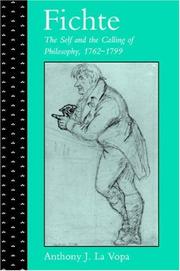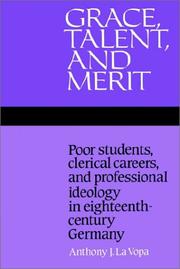| Listing 1 - 8 of 8 |
Sort by
|

ISBN: 0521791456 Year: 2001 Publisher: Cambridge Cambridge University press
Abstract | Keywords | Export | Availability | Bookmark
 Loading...
Loading...Choose an application
- Reference Manager
- EndNote
- RefWorks (Direct export to RefWorks)
Philosophers --- Self (Philosophy) --- Philosophes --- Moi (Philosophie) --- Biography --- History --- Biographies --- Histoire --- Fichte, Johann Gottlieb, --- -Scholars --- Fichte, Johann Gottlieb --- -Fichte, Johann Gottlieb

ISBN: 0521350417 0521525144 0511665113 Year: 1988 Publisher: Cambridge Cambridge University press
Abstract | Keywords | Export | Availability | Bookmark
 Loading...
Loading...Choose an application
- Reference Manager
- EndNote
- RefWorks (Direct export to RefWorks)
Poor students experienced a kind of upward mobility that was not uncommon in old-regime Europe. They were also objects of controversy. and as such they reveal the many dimensions of the issue of opening careers to talent. At stake were socially and politically sensitive questions about the relative importance of nature and nurture, of natural talent and 'birth', in realizing human potential; about the proper reconciliation of collective imperatives and individual freedom, of hierarchical stability and progress; about how national systems of education should be structured; about the kind and degree of upward mobility the society and the culture needed and could tolerate. This 1988 book shows how a cluster of familiar eighteenth-century ideas about grace, talent, and merit shaped a formative social experience for men whose importance is still celebrated today, as well as for members of the educated elite who were and have remained obscure.
Church and education --- -Educational sociology --- -Occupational mobility --- -Professions --- -Social mobility --- -Mobility, Social --- Sociology --- Career patterns --- Careers --- Jobs --- Professional services --- Occupations --- Interprofessional relations --- Vocational guidance --- Job mobility --- Mobility, Occupational --- Social mobility --- Education and sociology --- Social problems in education --- Society and education --- Sociology, Educational --- Education --- Education and church --- History --- -History --- -Aims and objectives --- Educational sociology --- Occupational mobility --- Professions --- -Church and education --- Mobility, Social --- Aims and objectives --- Arts and Humanities

ISBN: 9780511665110 9780521350419 9780521525145 Year: 1988 Publisher: Cambridge Cambridge University Press
Abstract | Keywords | Export | Availability | Bookmark
 Loading...
Loading...Choose an application
- Reference Manager
- EndNote
- RefWorks (Direct export to RefWorks)
Book
ISBN: 1802070826 Year: 2022 Publisher: Liverpool University Press
Abstract | Keywords | Export | Availability | Bookmark
 Loading...
Loading...Choose an application
- Reference Manager
- EndNote
- RefWorks (Direct export to RefWorks)
Over the last three decades Anthony La Vopa has extended his reach as an Enlightenment historian from Germany to England, Scotland, and France. Enlightenment Past and Present: Essays in a Social History of Ideas provides insights into all four contexts, with a view to understanding the Enlightenment's contours in spaces that were distinct but nonetheless shared in a European-wide engagement with a cluster of political, social, and cultural issues. The volume explores a wide variety of themes in the formation of modernity, including the construction of a public, the emergence of modern feminism, the problematic legitimacy of sexuality andmarriage, the ideal and practice of friendship, patron-client relations, the conversational sociability of politeness, and the evolution of the essay as a genre. La Vopa aims to demonstrate in practice the new interest in restoring the social to intellectual history without falling back into reductionism. He throws a spotlight on a number of key texts in eighteenth-century philosophy. In several essays, La Vopa employs the resources of meaning in rhetorical cultures with thick social contexts to present Enlightenment texts not simply as print records, but as rhetorical performances with specific audiences. He also often intertwines contexts by focusing on biographical experience, using 'private' life traces such as diaries and other forms of correspondence, to enhance our understanding of published discourse. While drawing on the history of philosophy, the volume takes a decidedly more historical path through the canon. It includes essay reviews which take stock of developments in Enlightenment studies via critical appraisals of major recent contributions to the field.
Enlightenment. --- Enlightenment --- Philosophy, Modern --- Eighteenth century. --- Enlightenment. --- Philosophy. --- biography --- Enlightenment --- the public --- gender --- French history --- private correspondence --- German history --- diaries --- social perspectives --- eighteenth-century philosophy --- intellectual history --- Social aspects. --- 1700-1799 --- biography --- Enlightenment --- the public --- gender --- French history --- private correspondence --- German history --- diaries --- social perspectives --- eighteenth-century philosophy --- intellectual history
Digital
ISBN: 9781802070828 Year: 2022 Publisher: Liverpool Oxford Liverpool University Press University of Oxford. Voltaire Foundation
Abstract | Keywords | Export | Availability | Bookmark
 Loading...
Loading...Choose an application
- Reference Manager
- EndNote
- RefWorks (Direct export to RefWorks)
Over the last three decades Anthony La Vopa has extended his reach as an Enlightenment historian from Germany to England, Scotland, and France. Enlightenment Past and Present: Essays in a Social History of Ideas provides insights into all four contexts, with a view to understanding the Enlightenment’s contours in spaces that were distinct but nonetheless shared in a European-wide engagement with a cluster of political, social, and cultural issues. The volume explores a wide variety of themes in the formation of modernity, including the construction of a public, the emergence of modern feminism, the problematic legitimacy of sexuality and marriage, the ideal and practice of friendship, patron-client relations, the conversational sociability of politeness, and the evolution of the essay as a genre. La Vopa aims to demonstrate in practice the new interest in restoring the social to intellectual history without falling back into reductionism. He throws a spotlight on a number of key texts in eighteenth-century philosophy. In several essays, La Vopa employs the resources of meaning in rhetorical cultures with thick social contexts to present Enlightenment texts not simply as print records, but as rhetorical performances with specific audiences. He also often intertwines contexts by focusing on biographical experience, using ‘private’ life traces such as diaries and other forms of correspondence, to enhance our understanding of published discourse. While drawing on the history of philosophy, the volume takes a decidedly more historical path through the canon. It includes essay reviews which take stock of developments in Enlightenment studies via critical appraisals of major recent contributions to the field.
Periodical
Year: 2010 Publisher: New York ; Basingstoke Palgrave Macmillan
Abstract | Keywords | Export | Availability | Bookmark
 Loading...
Loading...Choose an application
- Reference Manager
- EndNote
- RefWorks (Direct export to RefWorks)
Book
ISBN: 9780367360511 Year: 2020 Publisher: New York : Routledge Taylor & Francis Group,
Abstract | Keywords | Export | Availability | Bookmark
 Loading...
Loading...Choose an application
- Reference Manager
- EndNote
- RefWorks (Direct export to RefWorks)
Cameralism and the Enlightenment reassesses the relationship between two key phenomena of European history often disconnected from each other. It builds on recent insights from global history, transnational history and Enlightenment studies to reflect on the dynamic interactions of cameralism, an early modern set of practices and discourses of statecraft prominent in central Europe, with the broader political, intellectual and cultural developments of the Enlightenment world. Through contributions from prominent scholars across the field of Enlightenment studies, the volume analyzes eighteenth-century cameralist authors' engagements with commerce, colonialism and natural law. Challenging the caricature of cameralism as a German, land-locked version of mercantilism, the volume reframes its importance for scholars of the Enlightenment broadly conceived. This volume goes beyond the typical focus on Britain and France in studies of political economy, widening perspectives about the dissemination of ideas of governance, happiness and reform to focus on multidirectional exchanges across continental Europe and beyond during the eighteenth century. Emphasizing the practice of theory, it proposes the study of the porosity of ideas in their exchange, transmission and mediation between spaces and discourses as a key dimension of cultural and intellectual history. -- Provided by publisher.
Mercantile system --- Politique économique --- Enlightenment. --- Mouvement des Lumières --- Politique et gouvernement --- History --- Europe --- Europe --- Politics and government --- History. --- Economic policy --- History.


ISBN: 3892446652 Year: 2003 Publisher: Göttingen Wallstein Verlag
Abstract | Keywords | Export | Availability | Bookmark
 Loading...
Loading...Choose an application
- Reference Manager
- EndNote
- RefWorks (Direct export to RefWorks)
| Listing 1 - 8 of 8 |
Sort by
|

 Search
Search Feedback
Feedback About UniCat
About UniCat  Help
Help News
News